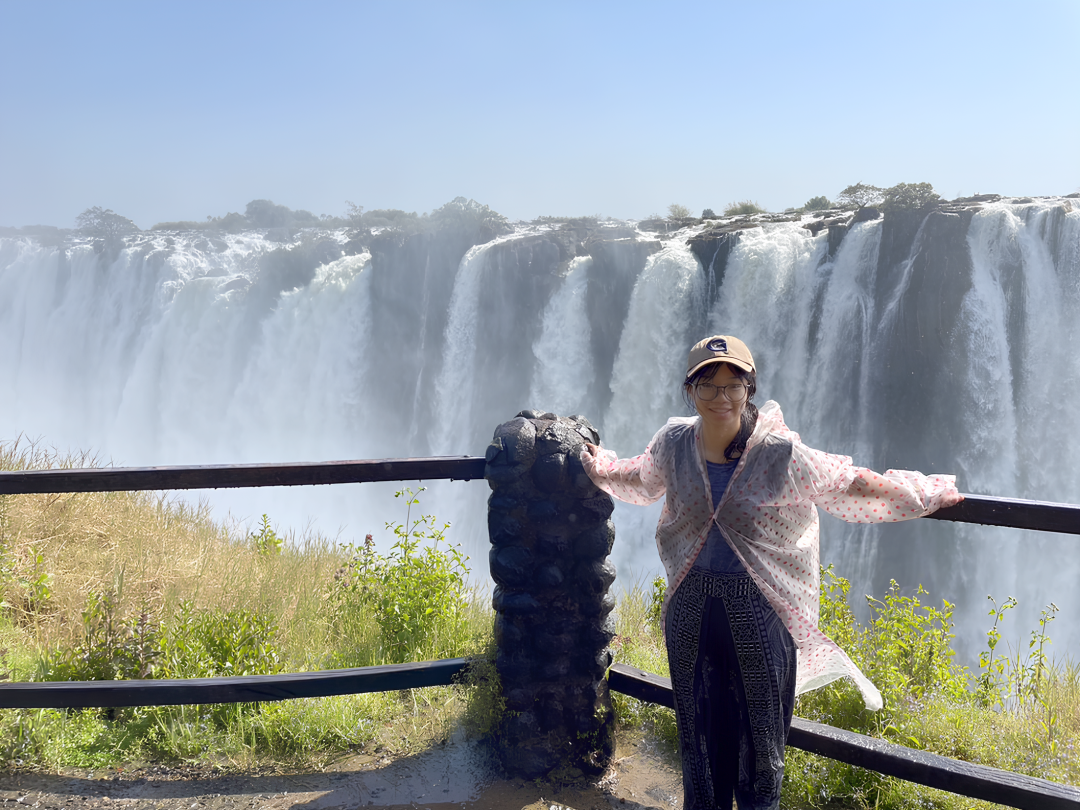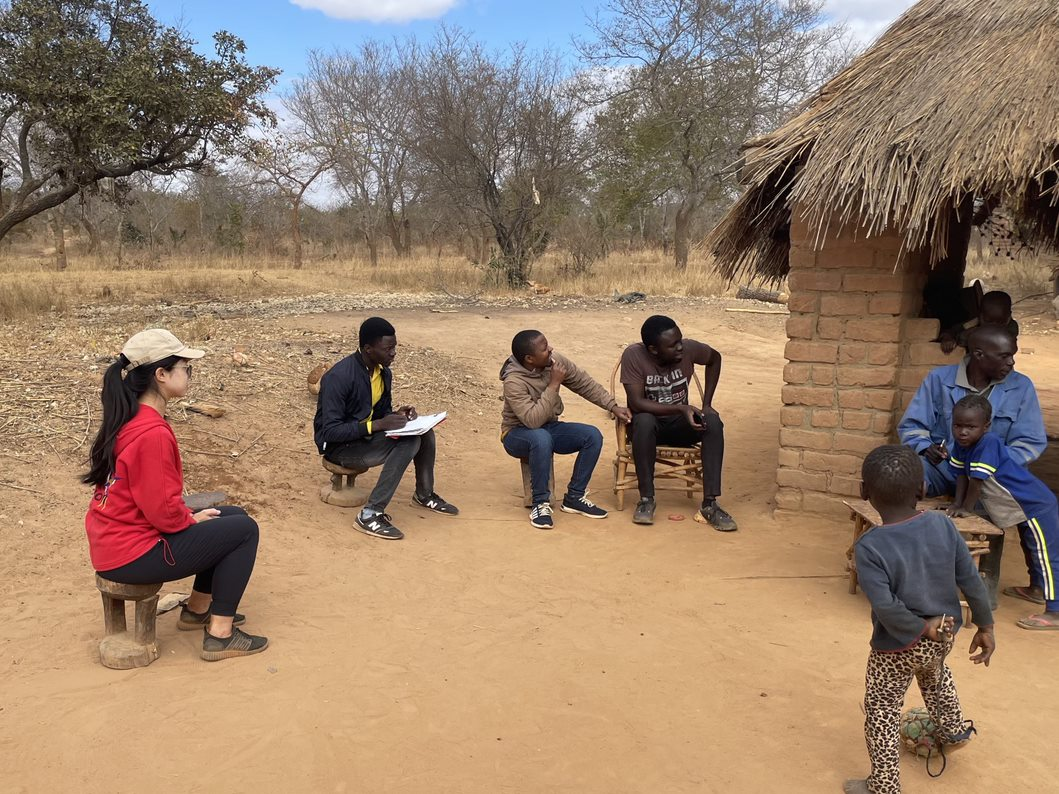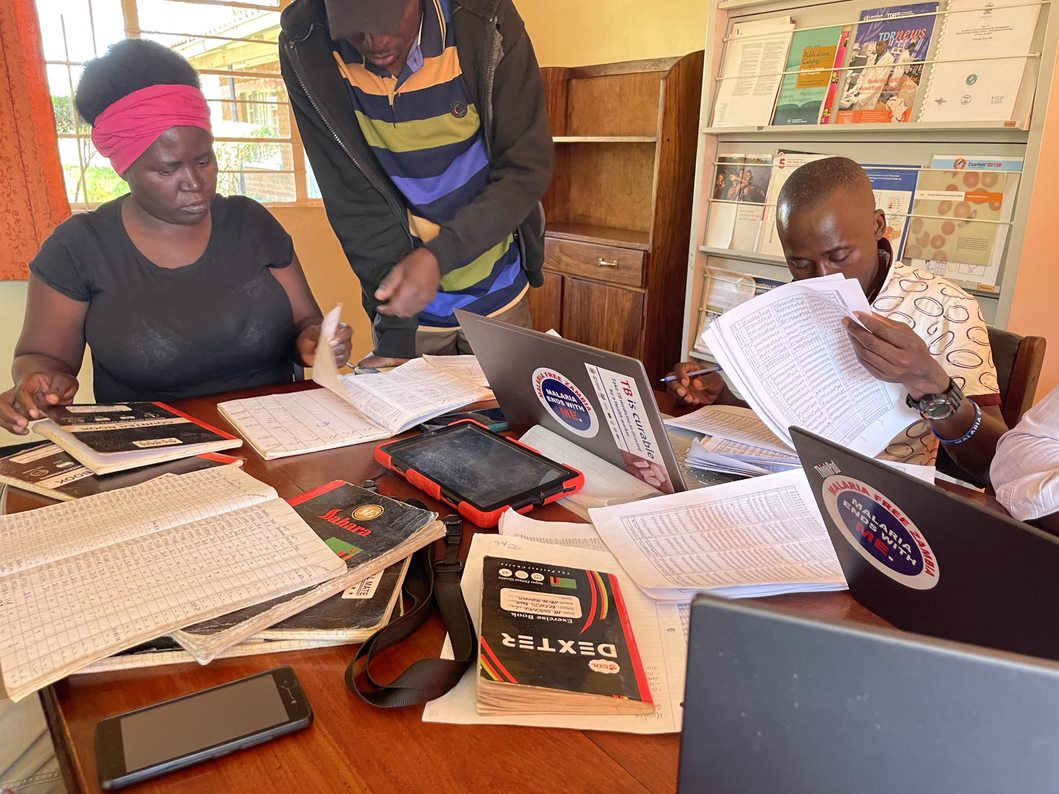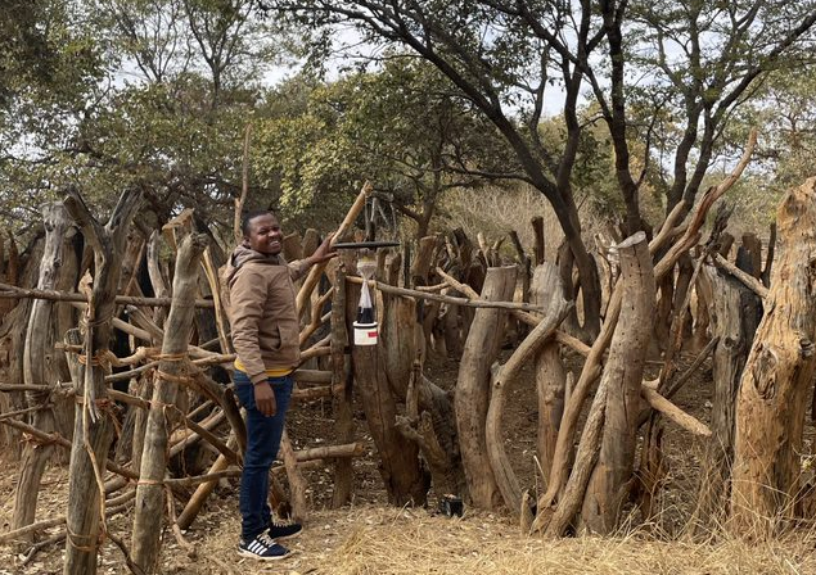When friends and family asked Xinyue Chen what she was doing in Africa, the former Duke Kunshan University student would often summarize her malaria research as “catching mosquitoes”.
One of the first to graduate from Duke Kunshan’s global health program as a member of the inaugural undergraduate Class of 2022, Chen is now in her second year of an M.Sc. degree in global disease epidemiology and control at the Johns Hopkins Bloomberg School of Public Health in the United States.
As someone passionate about conducting real-world epidemiological research into infectious diseases, she wanted to learn more about how public health practitioners gathered data, designed research methodologies and leveraged that knowledge to improve prevention and control measures.
When she heard of a project seeking a student researcher with quantitative data analysis skills who was willing to live and work in rural Zambia for at least two months, she wasted no time in applying for the post. She secured the funding through her master’s program and in the summer of 2023 was off to Zambia to study malaria.

It would be more accurate to say that the job opportunity she embraced happened to be in Africa, as opposed to her consciously setting out to find an internship there. She felt both energized and confident to set foot on a land in the southern hemisphere that she had never visited before, marking the beginning of a period of adventure and exploration.
The summer research project she joined falls under the International Centers of Excellence for Malaria Research (ICEMR), sponsored by the National Institutes of Health (NIH) in the U.S.
Among seven global malaria research center projects, the one focusing on southern and central Africa is led by the Johns Hopkins Bloomberg School of Public Health. The Duke Global Health Institute spearheads the one in Myanmar.
For the project, Chen would be based at the Macha Research Trust (MRT), located in Choma in the southern region of Zambia.
Macha Hospital was established there in 1957 by Dr. Alvan Thuma. Even today, the hospital maintains its reputation across Zambia for delivering high-quality medical services.
Decades later, Thuma’s son, Dr. Philip Thuma, followed in the footsteps of his father. He expanded the hospital’s operations, initiated malaria research in 1988, and formally founded a malaria research institute in 2005, now recognized as the MRT.
Since the research started, malaria rates in the area have plummeted over 95 percent, leading to a substantial reduction in infant and child mortality in recent years.
While at MRT, Chen frequently witnessed patients and their families camping outside hospitals after traveling long distances seeking treatment.


Over the past two decades, various international aid and malaria prevention and control measures have reduced malaria prevalence in the southern region of the country to 1 percent.
However, a small number of new cases continue to emerge. According to the World Health Organization’s criteria, malaria has yet to be eradicated in Zambia.
The research project in which Chen was involved was focused on implementing a method from China in the southern province of Zambia with the aim of eradicating malaria in that region.
This method, known as the “1-3-7” strategy, is one of the key strategies used by China to eliminate malaria, which it achieved in 2021.
Case diagnosis, investigation and follow-up must be completed within one, three and seven days, respectively. Chen plans to use the data from this project to complete her master’s thesis.
She found that, much like the approach she learned at DKU, malaria research work at MRT is interdisciplinary by nature.
Malaria is a parasitic disease transmitted by mosquitoes carrying Plasmodium parasites, so the research at MRT primarily covers the fields of epidemiology, entomology and serology.
Chen’s main role was to take charge of the epidemiological aspects of the project, including questionnaire design, data collection, data cleansing and analysis.

Throughout the data collection process, community workers fluent in local languages served as intermediaries and guides. With Zambia home to 72 languages, having at least one translator on the fieldwork team was essential.
“These colleagues are total social butterflies,” Chen remarked. “It
seems as if they know everyone and are familiar with every nook and cranny of the land.”
Following their local guides, the fieldwork team navigated the vast wilderness of Zambia during the dry season, driving to visit households where cases have been reported.
Field workers not only gather data through questionnaires on things like the use of mosquito nets and the malaria symptoms experienced, but also collect blood samples to be transported back to the laboratory to colleagues in the serology team for further testing and analysis.
The entomology team has its own fieldwork crew, diligently engaged in “mosquito-catching” activities. They installed mosquito traps in homes and gathered mosquito larvae from nearby water bodies.
Chen’s primary responsibility was to organize and analyze the data gathered during fieldwork, a task that may appear straightforward but in reality was laden with challenges.
The sheer volume and complexity of disease surveillance data required cross-comparison and validation across data sets and tables from multiple sources and hierarchies. And the digitizing and archiving of extensive data sets demanded a high level of summarization and communication skills.
Without effective communication, there was a risk of database confusion or wasting time on redundant tasks.

Faced with these challenges, Chen’s experience as a research assistant during her undergraduate studies proved invaluable.
She had previously worked on a project led by Dr. Lijing Yan from the Global Health Research Center at Duke Kunshan, focusing on community-empowered health management models and pathways for urban chronic disease patients.
In that role, she was primarily responsible for fieldwork, conducting information-gathering interviews, and questionnaire data collection and cleansing.
Her diverse research background equipped her with an understanding of various difficulties that could arise during this process.
She would rectify omissions and errors in data using statistical software like Stata or R Studio and perform other tasks such as data version control and facilitating communication and document sharing among research team members.
Chen was able to draw on the valuable experiences she gained as an undergraduate at DKU troubleshooting on the various projects she was involved in.
The project management skills she acquired at DKU continue to help her make an impact in different parts of the world.
In Zambia, her coding efforts significantly alleviated the burden of cleansing data manually, tackling and resolving numerous longstanding data issues.
Moreover, she regularly conducted entry-level training sessions on data management and visualization for her Zambian colleagues, helping them to understand and present the data they had carefully gathered.

In addition to work pressures, living in an unfamiliar continent posed its own challenges.
Chen had some concerns about the risk of contracting various diseases before embarking on her journey to Africa. But it was not something she was overly worried about given the preparations she had made beforehand.
Before her departure, Chen took a mandatory course run by her school for students participating in field research. “International Travel Preparation, Safety and Health” focused on travel to developing countries and regions and helped participants to identify risk levels and develop emergency evacuation plans in case of war or disease outbreaks, although she later discovered that Zambia was a safe and peaceful country.
“The most practical tip I gained from that class, surprisingly, was to apply sunscreen before mosquito repellent to ensure the effectiveness of both,” Chen chuckled.
She also took the initiative to be fully prepared, getting the required vaccinations and preparing the medication she might need.
For travelers, the standard method to prevent malaria is pre-exposure prophylaxis, which involves taking preventive medication before potential exposure, usually one pill daily.

This minimizes the risk of contracting malaria even if bitten by an infected mosquito, although experiencing nightmares and nausea from taking it on an empty stomach are common side effects.
However, during her two-month fieldwork in Zambia, Chen did not dwell too much on the risk of contracting malaria. “Compared to the United States, Zambia is more experienced and has cheaper treatment options for malaria. Besides, even if I happened to get infected, the hospital was next to my office,” she said.
Despite all her preparations, she could not shake off all her pre-departure anxiety, mainly stemming from fear of the unknown.
Zambia’s road infrastructure is significantly less developed compared to that of China and the United States.
To travel from the Zambian capital, Lusaka, to the Macha Research Trust (MRT) research center in Macha first requires a six-hour bus journey to the nearest town, Choma. From there, it took about an hour and a half by taxi.
“If I had traveled alone, I might not have been as composed,” Chen said. “Unlike in China, Zambia’s long-distance buses are entirely operated by private companies, leading to conductors from various companies following passengers and vying for their business. The bus station management is also chaotic, and the boarding process is unclear. Once, I almost mistakenly gave my ticket to an unlicensed driver. These experiences involving business and money were not so pleasant.”
Chen gathered all the tips and insights she had picked up during her two-month stint into a comprehensive manual to help future project members traveling to Zambia. The 15-page manual provided detailed guidance on accommodation, transportation, cuisine, language and culture.

Upon arriving in Zambia, Chen realized that she and those around her had a very narrow perspective on Africa.
Africa is a vast continent, spanning both the northern and southern hemispheres. When North America has its summer vacation, Zambia, nestled in the southern hemisphere, is in its dry season and experiencing the coldest two months of the year.
With minimal cloud cover, temperatures here are closely tied to sunlight, resulting in significant temperature fluctuations between day and night. Temperatures can reach nearly 30°C at noon but drop sharply after sunset, plummeting to as low as 1-2°C before dawn.
While working in Zambia, Chen chronicled the intriguing encounters she experienced in a diary, sharing daily updates with her friends via WeChat Moments, a feature for posting images and other content on the do-everything Chinese app.
By the end of her two-month stint, Chen’s diary had amassed a remarkable 50,000 words chronicling her unique experiences.
She visited one of the world’s three major waterfalls, Victoria Falls; saw with her own eyes the wildlife she had adored since childhood, herds of elephants, zebras and antelopes; met professors and students from the Penn State College of Medicine, joining them in lighting campfires to roast s’mores for local children; marveled at the vast Milky Way and the zodiac signs in the light pollution-free skies of southern African; made dumplings for her African colleagues and their families; and learned to eat “Nshima”, a staple food Zambia, with her hands.
For Chen, the experience has been transformative on both an academic and personal level, which is best conveyed through the reflections she made at the time in her diary.
“The real achievement of this journey to Africa for me is realizing self-worth more than learning new things,” she wrote.

“In the past, I often questioned the value of the small skills I acquired through trial and error, wondering if they were even worth mentioning in the ‘real’ global health research, which led to hesitation and indecision.
“But after coming here, I realized that the so-called ‘real’ global health is also built by individual patients, frontline health workers, fieldworkers, project coordinators, and so on.
“Public health is a discipline centered around people. Where there are people, there will inevitably be chaos, oversights, mistakes and errors. Therefore, even the hard-earned experiences have their significance.
“Every stumble I’ve taken could shed light on someone else’s next step. Every moment of self-doubt at DKU and JHU has, at certain moments, defined ‘me’, contributing to the value I bring to this project now.”
“The journey of continuously learning through trial and error, constantly refining small skills, is perhaps what we call growth.”
- Written by Yanfei Mao, DKU Class of 2022. See the Chinese original version here.

